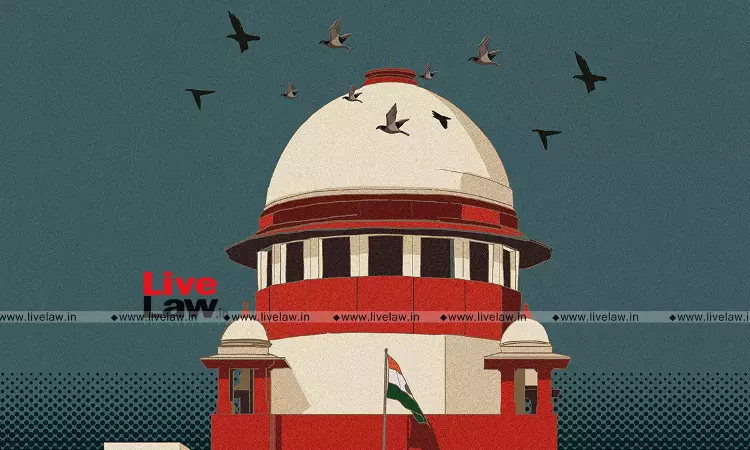- Home
- /
- Top Stories
- /
- Supreme Court Directs States To...
Supreme Court Directs States To Identify Laws Discriminating Against Leprosy-Affected Persons
Gursimran Kaur Bakshi
8 May 2025 1:08 PM IST
The Supreme Court on May 8 directed the States to form a Committee to identify the provisions in their laws, rules, regulations, by-laws etc., which discriminate against leprosy-affected or cured persons. The States were directed to take steps to remove such discriminatory provisions and make them conform with the Constitutional obligations.As per the brief background of the petition,...
The Supreme Court on May 8 directed the States to form a Committee to identify the provisions in their laws, rules, regulations, by-laws etc., which discriminate against leprosy-affected or cured persons. The States were directed to take steps to remove such discriminatory provisions and make them conform with the Constitutional obligations.
As per the brief background of the petition, 'Leprosy' was considered a dreaded disease because it was incurable, highly contagious, and infectious. During that time, there was a need to segregate the leprosy patients from society at large, and therefore, the Indian Lepers Act, 1898, was enacted to provide segregation of leprosy-affected persons.
The 1898 Act provided draconian provisions against the leprosy patients, such as arrest without warrant, putting them in Leprosy asylums and that they cannot have property rights or voting rights. They were also not allowed to seek employment. In a breakthrough in 1979, the Multi-Drug Therapy (MDT) was developed as a cure for leprosy at any stage. Since 1981, it has been extensively used in India to completely cure leprosy. As a result of a declaration by the World Health Organisation that leprosy is fully curable and not at all contagious, the 1898 Act was repealed.
As per the petitioner, the Federation of Leprosy Organisation, the discriminatory provisions against persons affected by leprosy continue to be in other states, rules and government orders. It is stated that the petitioner had, back in 2004, written to the Governments to remove such discriminatory provisions, but the still continue.
Before a bench of Justice Surya Kant and Justice NK Singh, Senior Advocate Vinay Garg submitted that as far as central Acts are concerned, there were four which were amended back in 2019. But there are still more than 100 legislations where such discriminatory provisions remain.
Appearing in the second petition for Vidhi Centre for Policy, Advocate Rashmi Nandakumar pointed out that there were at least 145 Acts which have offending provisions against Leprosy-affected persons. Justice Kant suggested that a State-wise compilation of legislation could be submitted because if the Court strikes down the provision, it will create a vacuum. Therefore, it's better that a State-wise direction is issued.
To get more clarity, the Court directed that a Committee be constituted to identify the discriminatory laws.
The order passed by the Court is as follows: "These matters filed in Public Interest against discriminatory, derogatory and demeaning provisions against leprosy affected persons. These provisions are of quite a range as ...leprosy being a ground of divorce before it came to be amended by Parliament in the pendency of these proceedings by the Personal Laws (Amendment) Act, 2019, which came to force on February 21, 2019.
We are informed that there might be more than 145 State legislations, besides regulations, bylaws, etc, operating in different lists where the offending provisions still continue across States. In the second case filed in 2017, notice was issued to all States with directions to look at this legislation and carry out necessary exercises, leaving no scope for discrimination.
We are not sure as to how many States have taken it seriously and earnestly to remove the offending and discriminatory provisions from the States' laws and bring them in conformity with the Constitution. Though a list of State laws has been appended with the petitions, it would be of little help to us due to chaotic and incomplete information.
We deem it appropriate to direct the Chief Secretaries and Law Secretaries of all States to immediately constitute a committee of officers from the Law & Justice Department of each State, preferably to be headed by an officer in the rank of Principal District Judge. State Government may request Hon'ble Chief Justices of the High Courts to provide an officer in the rank of District Judge to ensure...the request for the Principal District Judge should be sent within one week.
The Committee shall be constituted within 4 weeks from today. The said Committee shall identify all State laws where discriminatory expressions in respect of Leprosy-affected or cured persons are still part of the statute books. Such regulations, statutory rules or bylaws where similar provisions have been incorporated shall also be identified. This exercise shall include service rules, bylaws framed under different statutes like the Cooperative Societies Act, all Government orders containing such expressions..to take necessary initiatives and make their laws strictly in conformity with Constitutional commitments, and principles.
The Committee will also forward the report to the Registrar General of this Court. Standing Counsels for all States are directed to remain present and highlight the steps taken meanwhile. Registry directed to communicate this Order to Chief Secretaries and Advocate Generals."
Case Details: FEDERATION OF LEPY.ORGAN.FOLO . Vs UNION OF INDIA|W.P.(C) No. 83/2010
Appearances: Senior Advocate Vinay Garg and Mayuri Raghuvanshi, AOR [for Petitioners]
Additional Solicitor General, Aishwarya Bhati [for Respondent UOI]
Click Here To Read/Download Order



